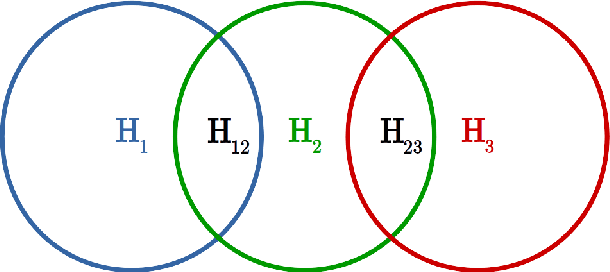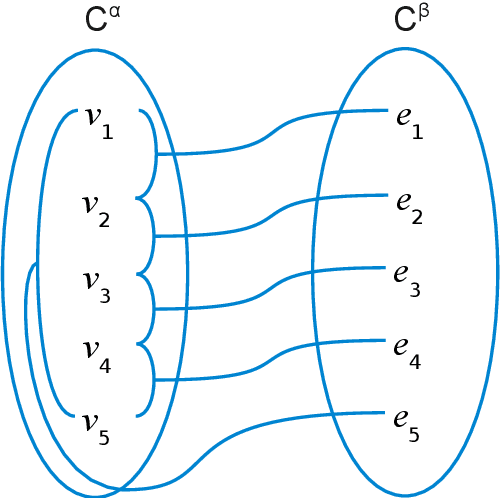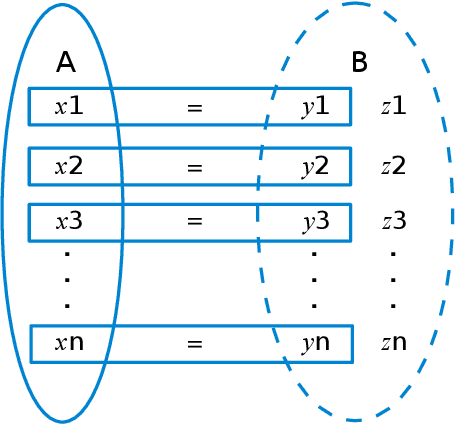Evgenij Thorstensen
On Equivalence and Cores for Incomplete Databases in Open and Closed Worlds
Jan 14, 2020Abstract:Data exchange heavily relies on the notion of incomplete database instances. Several semantics for such instances have been proposed and include open (OWA), closed (CWA), and open-closed (OCWA) world. For all these semantics important questions are: whether one incomplete instance semantically implies another; when two are semantically equivalent; and whether a smaller or smallest semantically equivalent instance exists. For OWA and CWA these questions are fully answered. For several variants of OCWA, however, they remain open. In this work we adress these questions for Closed Powerset semantics and the OCWA semantics of Libkin and Sirangelo, 2011. We define a new OCWA semantics, called OCWA*, in terms of homomorphic covers that subsumes both semantics, and characterize semantic implication and equivalence in terms of such covers. This characterization yields a guess-and-check algorithm to decide equivalence, and shows that the problem is NP-complete. For the minimization problem we show that for several common notions of minimality there is in general no unique minimal equivalent instance for Closed Powerset semantics, and consequently not for the more expressive OCWA* either. However, for Closed Powerset semantics we show that one can find, for any incomplete database, a unique finite set of its subinstances which are subinstances (up to renaming of nulls) of all instances semantically equivalent to the original incomplete one. We study properties of this set, and extend the analysis to OCWA*.
Generating Ontologies from Templates: A Rule-Based Approach for Capturing Regularity
Sep 27, 2018
Abstract:We present a second-order language that can be used to succinctly specify ontologies in a consistent and transparent manner. This language is based on ontology templates (OTTR), a framework for capturing recurring patterns of axioms in ontological modelling. The language and our results are independent of any specific DL. We define the language and its semantics, including the case of negation-as-failure, investigate reasoning over ontologies specified using our language, and show results about the decidability of useful reasoning tasks about the language itself. We also state and discuss some open problems that we believe to be of interest.
Mapping Data to Ontologies with Exceptions Using Answer Set Programming
Jul 07, 2016Abstract:In ontology-based data access, databases are connected to an ontology via mappings from queries over the database to queries over the ontology. In this paper, we consider mappings from relational databases to first-order ontologies, and define an ASP-based framework for GLAV mappings with queries over the ontology in the mapping rule bodies. We show that this type of mappings can be used to express constraints and exceptions, as well as being a powerful mechanism for succinctly representing OBDA mappings. We give an algorithm for brave reasoning in this setting, and show that this problem has either the same data complexity as ASP (NP- complete), or it is at least as hard as the complexity of checking entailment for the ontology queries. Furthermore, we show that for ontologies with UCQ-rewritable queries there exists a natural reduction from mapping programs to \exists-ASP, an extension of ASP with existential variables that itself admits a natural reduction to ASP.
Structural Decompositions for Problems with Global Constraints
Feb 09, 2015

Abstract:A wide range of problems can be modelled as constraint satisfaction problems (CSPs), that is, a set of constraints that must be satisfied simultaneously. Constraints can either be represented extensionally, by explicitly listing allowed combinations of values, or implicitly, by special-purpose algorithms provided by a solver. Such implicitly represented constraints, known as global constraints, are widely used; indeed, they are one of the key reasons for the success of constraint programming in solving real-world problems. In recent years, a variety of restrictions on the structure of CSP instances have been shown to yield tractable classes of CSPs. However, most such restrictions fail to guarantee tractability for CSPs with global constraints. We therefore study the applicability of structural restrictions to instances with such constraints. We show that when the number of solutions to a CSP instance is bounded in key parts of the problem, structural restrictions can be used to derive new tractable classes. Furthermore, we show that this result extends to combinations of instances drawn from known tractable classes, as well as to CSP instances where constraints assign costs to satisfying assignments.
Tractable Combinations of Global Constraints
Jul 10, 2013


Abstract:We study the complexity of constraint satisfaction problems involving global constraints, i.e., special-purpose constraints provided by a solver and represented implicitly by a parametrised algorithm. Such constraints are widely used; indeed, they are one of the key reasons for the success of constraint programming in solving real-world problems. Previous work has focused on the development of efficient propagators for individual constraints. In this paper, we identify a new tractable class of constraint problems involving global constraints of unbounded arity. To do so, we combine structural restrictions with the observation that some important types of global constraint do not distinguish between large classes of equivalent solutions.
Lifting Structural Tractability to CSP with Global Constraints
Jul 06, 2013Abstract:A wide range of problems can be modelled as constraint satisfaction problems (CSPs), that is, a set of constraints that must be satisfied simultaneously. Constraints can either be represented extensionally, by explicitly listing allowed combinations of values, or implicitly, by special-purpose algorithms provided by a solver. Such implicitly represented constraints, known as global constraints, are widely used; indeed, they are one of the key reasons for the success of constraint programming in solving real-world problems. In recent years, a variety of restrictions on the structure of CSP instances that yield tractable classes have been identified. However, many such restrictions fail to guarantee tractability for CSPs with global constraints. In this paper, we investigate the properties of extensionally represented constraints that these restrictions exploit to achieve tractability, and show that there are large classes of global constraints that also possess these properties. This allows us to lift these restrictions to the global case, and identify new tractable classes of CSPs with global constraints.
 Add to Chrome
Add to Chrome Add to Firefox
Add to Firefox Add to Edge
Add to Edge